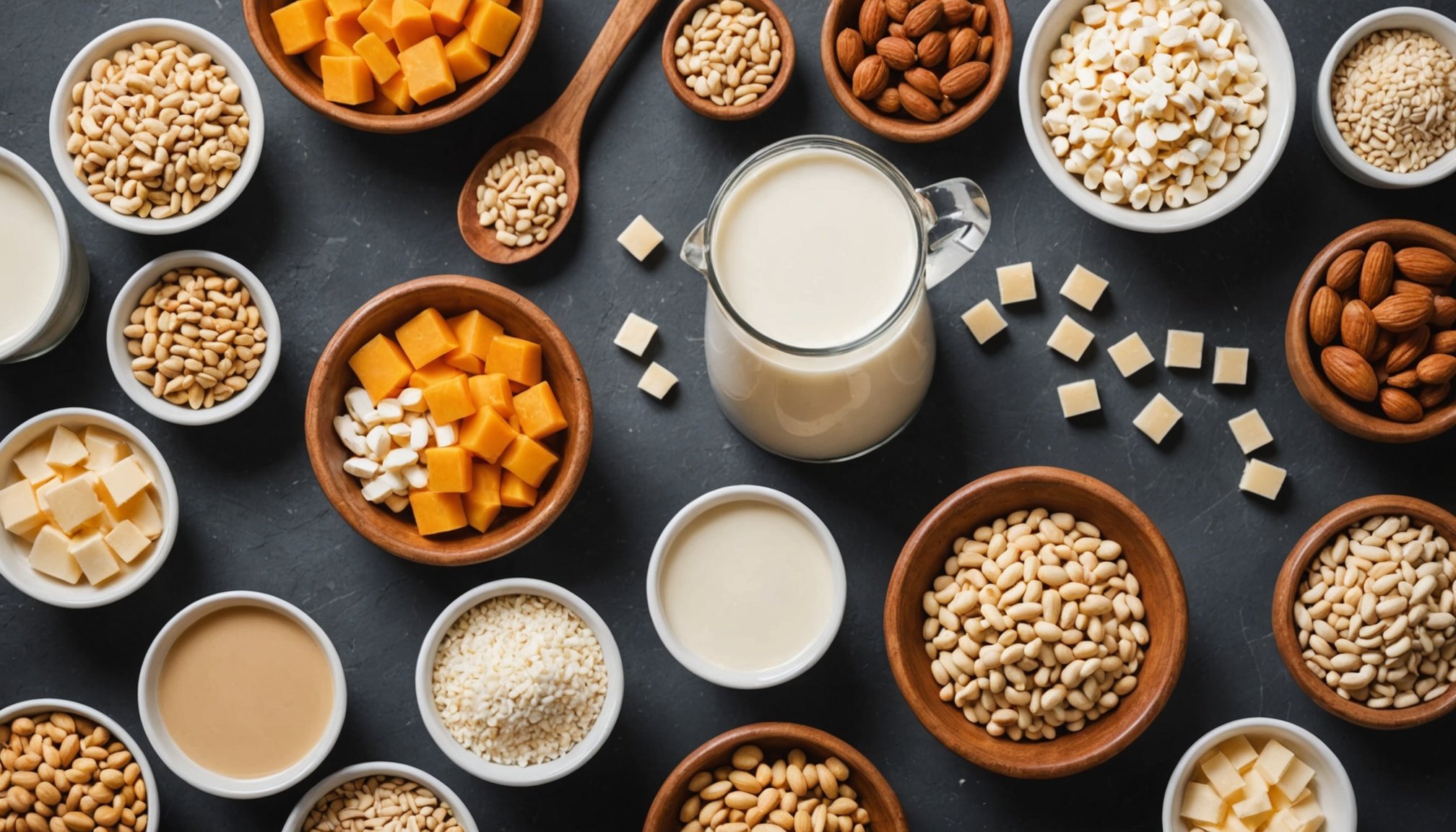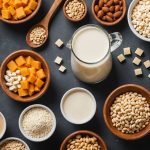Key Non-Dairy Calcium Sources
Understanding non-dairy calcium-rich foods is essential for those who are lactose intolerant or simply avoiding dairy. These alternatives play a crucial role in maintaining optimal health as calcium is vital for bone density, heart function, and muscle contractions.
Several non-dairy calcium sources are available, ensuring that your diet remains diverse and nutritious. Leafy greens like kale and spinach pack a calcium punch while also offering beneficial nutrients such as vitamins A and C. Similarly, broccoli not only delivers calcium but also boosts your intake of fibre and antioxidants.
Also to see : Boost Your Health: Creative Ways to Add Superfoods to the UK Diet
In addition, tofu and other fortified foods, like plant-based milks and orange juice, are excellent sources of calcium. Look for labels indicating calcium fortification to maximise your intake. While almonds and sesame seeds provide smaller calcium amounts, they offer versatility. You can add them to snacks, salads, or baked goods for added nutritional value.
Including non-dairy calcium sources in your diet provides the benefits of increased calcium levels without relying on dairy. This flexibility allows you to meet your calcium requirements, improving bone health, reducing the risk of osteoporosis, and promoting heart health. By exploring these options, achieving a well-rounded diet becomes enjoyable and accessible.
Also to read : Essential Tips for UK Vegetarians to Boost Iron Levels in Their Diet
Nutritional Profile of Non-Dairy Calcium Foods
Exploring the nutritional values of non-dairy foods can offer a diverse range of health benefits, especially for those seeking alternatives to traditional dairy. These foods provide essential nutrients, including calcium, necessary for bone health and other bodily functions.
Plant-Based Calcium Sources
Plant-based foods are rich in calcium and other nutrients. Nutritional values of non-dairy foods include high calcium content in greens such as kale and broccoli, seeds like chia and sesame, and fortified plant milks. These sources frequently also contain vitamins and minerals like vitamin K and magnesium, which support calcium absorption.
Fortified Products
Fortified products are excellent alternatives for meeting calcium requirements. These products, like fortified orange juice and cereals, have added minerals to enhance their nutritional values. They provide an accessible option to increase calcium intake without turning to dairy.
Seafood Options
Some seafood options are naturally high in calcium, making them a viable choice for those intolerant to dairy. Sardines and salmon, often consumed with bones, deliver not just calcium but also omega-3 fatty acids, crucial for cardiovascular health.
Incorporating these nutritional values of non-dairy foods into your diet can ensure an adequate calcium intake, supporting overall health while accommodating dietary needs.
Recommended Non-Dairy Calcium-Rich Foods
Understanding non-dairy calcium sources is essential for those avoiding dairy. Here’s an overview of the top non-dairy foods rich in calcium available in the UK.
1. Leafy Greens: Vegetables like kale, collard greens, and broccoli are not just nutritious but also calcium powerhouses. These leafy greens are widely accessible in supermarkets and farmer’s markets across the UK, making them a convenient option.
2. Fortified Plant Milks: Numerous brands offer plant-based milks fortified with calcium. Almond, soy, and oat milk are popular options favored for their versatility in cooking and beverages. Always look for brands that specify fortification with calcium on their labels for maximum benefit.
3. Tofu: This soy-based product often comes fortified with additional calcium. Known for its versatility, tofu can be included in stir-fries, salads, or as a meat substitute, providing a robust calcium intake.
4. Nuts and Seeds: Almonds and chia seeds are crunchy, natural snacks laden with calcium. These can be added to salads or yogurts, enhancing both flavor and nutrition.
Availability in the UK: Most of these non-dairy calcium foods are readily available at all major supermarkets. Brands like Alpro for plant milks and Cauldron for tofu are well-regarded and commonly found on shelves, making it easier to maintain calcium intake without dairy.
Incorporating Non-Dairy Calcium Foods into Your Diet
Including non-dairy calcium-rich foods in your daily meals can be both simple and rewarding. Here are some practical tips to ensure you’re getting enough calcium without relying on dairy.
Consider leafy greens like kale, collard greens, and broccoli as excellent sources. You can easily integrate them into salads or stir-fries. Additionally, seeds such as chia and sesame are potent calcium sources. Sprinkle them over your breakfast cereal or yogurt for a crunchy boost.
Fortified products like plant-based milks (almond, soy, or rice milk) and orange juice often contain added calcium. Check labels to ensure you’re choosing options with adequate calcium fortification.
When preparing meals, aim to combine various non-dairy foods to optimize your calcium intake. For instance, include tofu, which is often set with calcium sulfate, in your stir-fries or soups. This way, you can effortlessly incorporate calcium into multiple dishes throughout the week.
Balanced meal planning is crucial for those following a lactose-free diet. Remember to diversify your meals with different plant-based sources to meet nutritional needs. Explore various recipes and cooking methods to keep your meals exciting and nutritious, ensuring a consistent intake of calcium without reliance on dairy products.
Addressing Common Concerns Regarding Lactose Intolerance
Living with lactose intolerance can significantly affect dietary choices, leading many to question if they’re still getting sufficient nutrition. Essentially, lactose intolerance occurs when the body lacks enough lactase, the enzyme needed to digest lactose found in dairy products. This can result in discomfort after consuming dairy, like bloating and diarrhoea.
One common worry is maintaining sufficient calcium intake, as dairy is a primary source. Fortunately, there are various strategies to manage symptoms while ensuring proper nutrition. Incorporating lactose-free milk products, which have added lactase, is one approach. They provide the nutritional benefits of regular dairy without the unwanted symptoms. Additionally, many lactose-intolerant individuals can tolerate small amounts of dairy, such as hard cheeses and yoghurt, thanks to their lower lactose content.
Beyond dairy, other calcium-rich foods such as fortified plant-based milks, leafy greens, and almonds can bolster intake. Prioritising a diverse diet helps mitigate any nutritional gaps.
It’s crucial to consult with healthcare providers for personalised nutrition advice tailored to specific needs. They can devise a plan that balances symptom management with nutritional adequacy. Remember, each person’s level of intolerance may vary, and finding what’s effective for one might not work for another.
Potential Allergens in Non-Dairy Calcium Sources
Exploring allergens in non-dairy foods is crucial for individuals seeking lactose-free calcium sources. Various plant-based options, like almond or soy milk, offer calcium but may contain potential allergens.
Overview of Common Allergens
Non-dairy foods often substitute for milk but pose risks for those with allergies. Soy, almonds, and other nuts are prevalent in non-dairy products and are common allergens themselves. Many consumers turning to these alternatives might unknowingly expose themselves to reactions if they are sensitive to these ingredients.
Label Reading Tips
Understanding and reading labels is essential to avoid allergens. Always look for bolded ingredients that suggest allergen content. Labels might list calcium additives, which is the focus, but miss hidden allergens like nuts or soy derivatives. Ideally, getting familiar with synonyms of allergens helps in identifying them among complex ingredient lists.
Safe Food Choices for Lactose-Intolerant Individuals
When selecting non-dairy calcium-rich options, prioritising safer choices is recommended. Coconut or rice milk are generally considered lower-risk alternatives for those avoiding soy or nut allergens. Some calcium-fortified juices also offer a good option. Always aiming for labels that explicitly state “allergen-free” reduces risk and ensures safe consumption. Always consult a healthcare provider when unsure about safe food choices.











